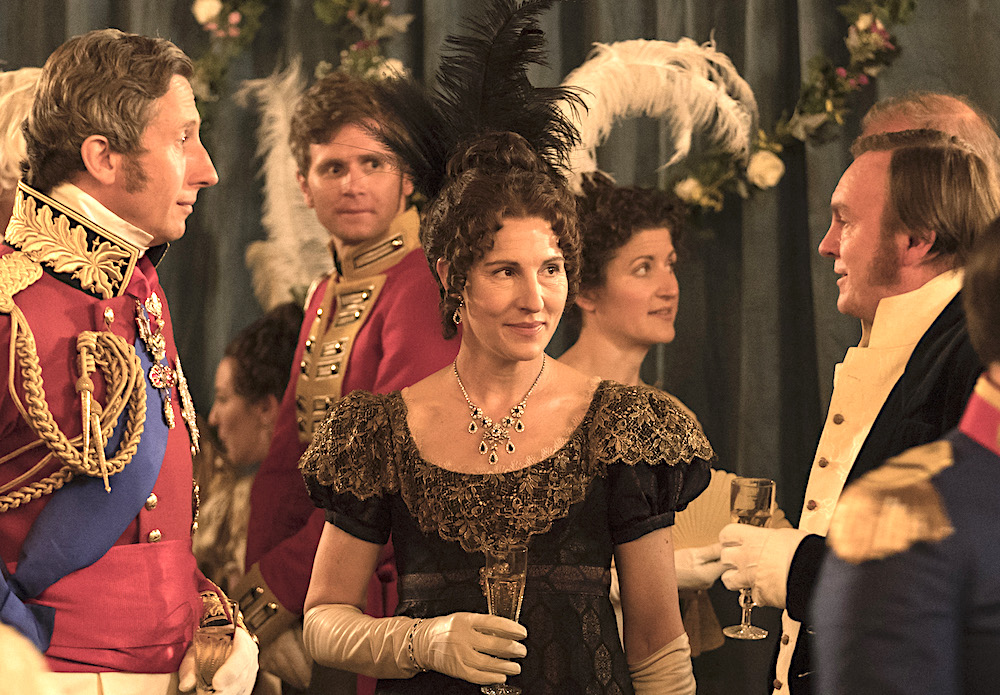The prolific Lord Fellowes returns with this six-part adaptation of his own novel (for ITV), a niftily-wrought yarn (originally issued in online instalments) about the old aristocracy and the rise of new money in the early 19th Century. Some are inevitably calling it the “new Downton”, but it really isn’t.
Fellowes, the assiduous social historian, has planted his story firmly in factual soil. It opens at a pivotal moment in the Napoleonic Wars, when the Duchess of Richmond held her celebrated ball at her temporary home in Brussels on 15 June, 1815. This was days before the battle of Waterloo, which finally kiboshed the great expectations of the Little Corporal and in due course ushered in a new age of peace and prosperity.
The seeds of the ensuing drama are sown in the feverish preparations for the climactic battle, as the Duke of Wellington (a convincingly imperious Nicholas Rowe) is forced to cut short his supper to meet the threat of Napoleon’s forces, advancing at unexpected speed towards Brussels. He briskly summons his officers, as well as James Trenchard (Philip Glenister), his esteemed victualler (or quartermaster), and sets off to prepare for battle. Wellington, much impressed with Trenchard’s skill in keeping his army fed and watered, refers to Trenchard as the “magician”, and predicts a bright future for him in the post-war world – though he adds a warning that Trenchard should not let himself be distracted by the frivolous “geegaws” of society life (pictured below, Nicholas Rowe, Tamsin Greig and Philip Glenister).
 Fellowes loves a bit of class friction, so much more nuanced than actual warfare, and the motor of his story here is the corrosive effect of social overreach. Trenchard and his wife Anne (Tamsin Greig, bang on the money) represent the rise of the middle classes (she’s a schoolmaster’s daughter). While James has a thick skin and a robust, can-do attitude that enables him to barge through social barriers (Glenister describes his character as “a cross between Donald Trump and Del Boy”), Anne is acutely conscious of where the social tripwires lie. She is particularly concerned for the welfare of her daughter Sophia (Emily Reid), who has tumbled into an infatuation with handsome young cavalry officer, Lord Bellasis (Jeremy Neumark Jones). Sophia thinks it’s a mutual love-match. Anne thinks her daughter is being taken for a ride.
Fellowes loves a bit of class friction, so much more nuanced than actual warfare, and the motor of his story here is the corrosive effect of social overreach. Trenchard and his wife Anne (Tamsin Greig, bang on the money) represent the rise of the middle classes (she’s a schoolmaster’s daughter). While James has a thick skin and a robust, can-do attitude that enables him to barge through social barriers (Glenister describes his character as “a cross between Donald Trump and Del Boy”), Anne is acutely conscious of where the social tripwires lie. She is particularly concerned for the welfare of her daughter Sophia (Emily Reid), who has tumbled into an infatuation with handsome young cavalry officer, Lord Bellasis (Jeremy Neumark Jones). Sophia thinks it’s a mutual love-match. Anne thinks her daughter is being taken for a ride.
Fast-forward 26 years, and James has formed a spectacularly successful partnership with the master builder Thomas Cubitt, with whom he has helped to create such defining icons of London’s evolution as Gordon Square, Tavistock Square and the titular Belgrave Square (“this spangled city for the rich”, as Harriet Walter’s Lady Brockenhurst would have it). It’s a new age of affluence and galloping social expansion, but our characters (for all their apparent success) are living in the shadow of misjudgements and a particularly cynical con-trick carried out all those years ago.
Fellowes’s sense of the way great sorrows follow us around like a suffocating shroud is keenly drawn, and the encounters between Anne Trenchard, Lady Brockenhurst and the elderly Duchess of Bedford (Naomi Frederick), looking back at a past in which their experiences overlapped far more than they’d realised, were powerfully affecting. And that was only episode one...















Add comment